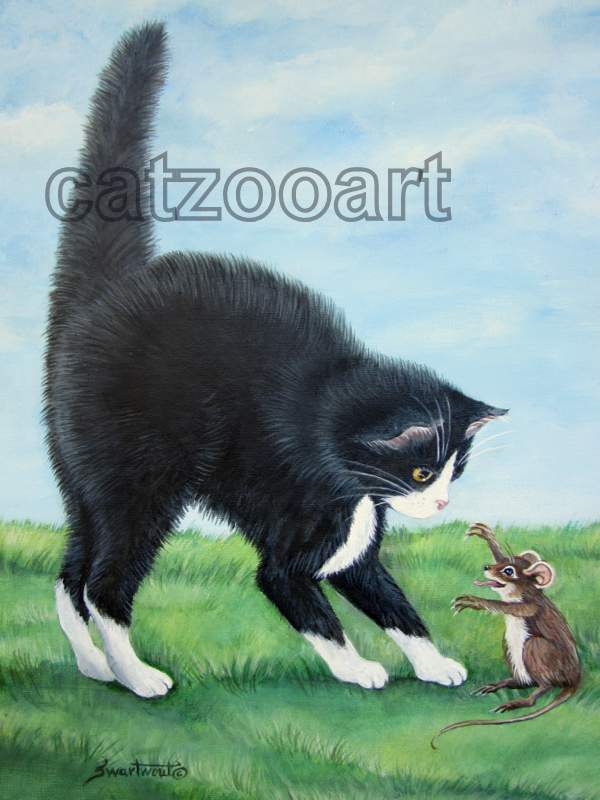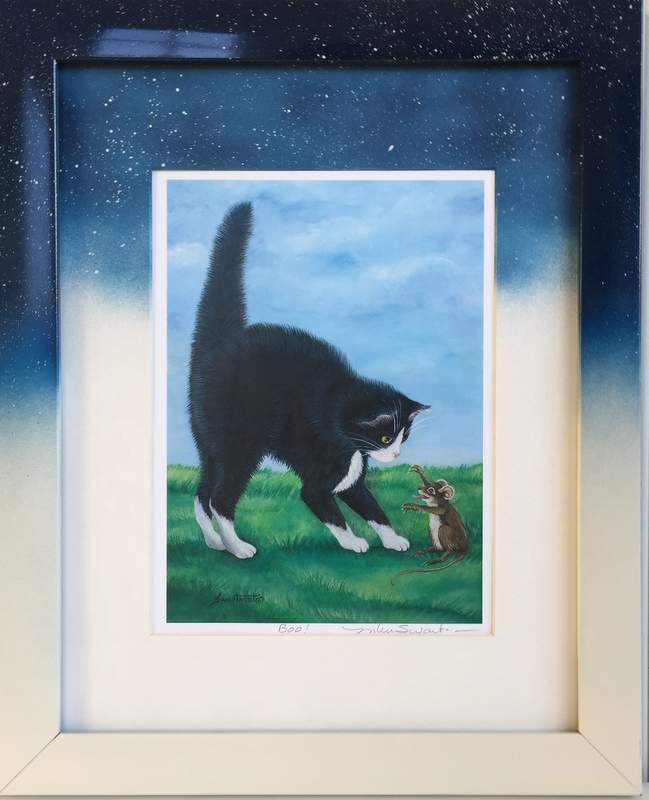Mouse Scares Cat: The Fascinating Phenomenon Explained
Have you ever wondered how a tiny mouse could scare a cat? This seemingly counterintuitive scenario has intrigued animal enthusiasts and behavioral scientists alike. The phrase "mouse scares cat" might sound like a contradiction, but there are compelling reasons why this phenomenon occurs. Understanding the dynamics between these two creatures offers valuable insights into animal behavior and predator-prey relationships.
While cats are natural predators and mice are their prey, certain factors can lead to situations where a mouse appears to intimidate a cat. This reversal of roles is not as rare as one might think. In this article, we will explore the science behind this fascinating occurrence, delve into real-life examples, and uncover the underlying reasons why it happens.
By the end of this article, you will gain a deeper understanding of the complex interactions between mice and cats. Whether you are a pet owner, an animal behavior enthusiast, or simply curious about the natural world, this topic promises to be both enlightening and entertaining.
- Winner Of Season 13 Project Runway
- What Sign Is The Grinch
- Angela Bassett Swimsuit
- Hugh Grant Colin Firth Friends
- Nude Ricki Lake
Table of Contents
- Introduction to Mouse Scares Cat Phenomenon
- Understanding the Cat and Mouse Relationship
- The Fear Factor in Animals
- Real-Life Examples of Mice Scaring Cats
- Biological Reasons Behind the Phenomenon
- Environmental Factors Influencing Behavior
- Cat Behavior and Response to Mice
- Advantages Mice Have Over Cats
- Scientific Studies on Mouse-Cat Interactions
- Conclusion and Final Thoughts
Introduction to Mouse Scares Cat Phenomenon
The concept of a mouse scaring a cat may seem bizarre at first glance, but it is a phenomenon rooted in animal psychology and behavior. Cats, known for their predatory instincts, are generally expected to hunt mice without hesitation. However, there are instances where the tables turn, and a mouse manages to intimidate a feline. This reversal of roles is not only intriguing but also offers valuable insights into the complexities of animal behavior.
In this section, we will explore the basics of the "mouse scares cat" phenomenon, setting the stage for a deeper dive into the science behind it. Understanding the foundational aspects of this interaction is crucial for grasping the broader implications of predator-prey dynamics.
Understanding the Cat and Mouse Relationship
Traditional Predator-Prey Dynamics
The relationship between cats and mice is one of the most classic examples of predator-prey dynamics in nature. Cats have evolved over millennia to be efficient hunters, with sharp claws, quick reflexes, and a keen sense of hearing. Mice, on the other hand, rely on their agility, speed, and ability to hide in small spaces to evade capture.
- Sofia Detorres
- Simone Biles Outfit Bears
- Girl Who Killed Herself After Being Bullied 2024 Aubrey
- Mens Clinical Strength Deodorant
- Will And Zach Zulock
Exceptions to the Rule
While the traditional narrative suggests that cats always dominate mice, there are exceptions to this rule. Certain circumstances can lead to a reversal of roles, where a mouse appears to have the upper hand. These exceptions are influenced by a variety of factors, including environmental conditions, individual animal behavior, and psychological elements.
The Fear Factor in Animals
Fear is a powerful emotion that influences the behavior of all animals, including cats and mice. In some cases, a mouse's behavior can trigger a fear response in a cat, leading to the latter's retreat or hesitation. This phenomenon is often attributed to the unpredictability of the mouse's actions, which can confuse or startle the cat.
For instance, a sudden movement or sound made by a mouse can evoke a fear response in a cat, causing it to freeze or retreat. Understanding the role of fear in animal interactions is essential for comprehending the "mouse scares cat" phenomenon.
Real-Life Examples of Mice Scaring Cats
There are numerous documented cases of mice successfully intimidating cats. One such example involves a domestic cat encountering a particularly bold mouse in its home. Instead of pursuing the mouse, the cat exhibited signs of fear and backed away, allowing the mouse to escape unharmed.
- A video captured in a suburban home showed a mouse confronting a cat face-to-face, causing the feline to retreat.
- Another instance involved a group of mice working together to drive a cat away from their nesting area.
- In a controlled experiment, researchers observed that certain mice exhibited aggressive behaviors when threatened by a cat, effectively deterring the predator.
Biological Reasons Behind the Phenomenon
Instinctual Responses
Biologically, both cats and mice are driven by instinctual responses that dictate their behavior in various situations. For cats, the instinct to hunt is strong, but it can be overridden by other factors such as fear or confusion. Mice, on the other hand, have developed sophisticated survival mechanisms that allow them to evade predators and, in some cases, intimidate them.
Neurological Factors
Research has shown that the neurological responses of animals play a significant role in determining their behavior. In the case of cats, a sudden or unexpected stimulus from a mouse can trigger a neurological response that overrides their predatory instincts, leading to a retreat or hesitation.
Environmental Factors Influencing Behavior
The environment in which cats and mice interact can significantly influence their behavior. Factors such as lighting, noise levels, and the availability of hiding spots can all contribute to the dynamics of their relationship. For example, a dimly lit room with plenty of hiding spots for mice may make a cat more cautious and less likely to pursue its prey aggressively.
Cat Behavior and Response to Mice
Individual Variations
Not all cats respond to mice in the same way. Individual differences in temperament, past experiences, and training can affect how a cat interacts with a mouse. Some cats may exhibit a strong hunting drive, while others may show little interest or even fear in the presence of a mouse.
Training and Conditioning
Cats can be trained or conditioned to behave differently around mice. For example, a cat that has been raised in a home with pet mice may develop a more tolerant attitude toward them. Similarly, a cat that has had negative experiences with mice in the past may exhibit fear or hesitation when encountering them.
Advantages Mice Have Over Cats
Agility and Speed
Mice possess several advantages over cats that can contribute to their ability to intimidate them. Their agility and speed allow them to move quickly and unpredictably, making it difficult for cats to anticipate their movements. Additionally, mice can fit into small spaces, giving them a tactical advantage in certain environments.
Noise and Distraction
Mice are adept at using noise and distraction to their advantage. A sudden squeak or rustling sound can startle a cat, giving the mouse an opportunity to escape. This ability to manipulate their surroundings adds another layer of complexity to the predator-prey dynamic.
Scientific Studies on Mouse-Cat Interactions
Scientific research has shed light on the intricacies of mouse-cat interactions. Studies conducted in controlled environments have revealed fascinating insights into the behaviors of both species. For example, researchers have observed that certain mice exhibit bold or aggressive behaviors when threatened by a cat, effectively deterring the predator.
These studies not only enhance our understanding of animal behavior but also provide valuable information for pet owners and animal enthusiasts. By studying the interactions between cats and mice, scientists hope to gain a deeper understanding of predator-prey relationships in nature.
Conclusion and Final Thoughts
In conclusion, the phenomenon of a mouse scaring a cat is a fascinating example of the complexities of animal behavior. While cats are natural predators and mice are their prey, certain factors can lead to a reversal of roles, where a mouse appears to intimidate a cat. This phenomenon is influenced by a variety of factors, including fear, instinctual responses, environmental conditions, and individual animal behavior.
We invite you to share your thoughts and experiences in the comments section below. Have you ever witnessed a mouse scaring a cat? What insights have you gained from observing these interactions? Additionally, we encourage you to explore other articles on our site that delve into the fascinating world of animal behavior and science.
- Sofia Detorres
- Eureka Cordless Vacuum
- Selma Blair Nudes
- Who Are The Five Living Presidents
- Northern Lights Alabama Tonight

Mouse Scares Cat Says Boo catzooart

Mouse Scares Cat Says Boo catzooart

Cat Afraid of Mouse Mouse Scares Cat Funny Cute animals, Cute